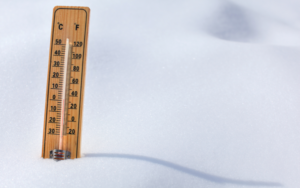
With falling temperatures and energy bills set to rise again in April 2025, you may be concerned about the cost to heat your home this winter. However, there are a number of grants and schemes from the government that help towards the cost of energy bills throughout the winter months.
In this article, we look at the Cold Weather Payment including how it works, who is eligible and how to apply. For more information on the help available from the government read our article, 'Grants and schemes for help with your energy bills'.
What is the Cold Weather Payment?
The Cold Weather Payment is a £25 payment paid to eligible households by the government when the temperature drops below a certain level for 7 consecutive days. The government scheme applies from 1st November 2024 - 31st March 2025 and is triggered if the average temperature in your area is either forecast to be, or recorded as, 0°C or below over a consecutive 7-day period. The Cold Weather Payment is paid to eligible households in England, Wales and Northern Ireland.
If you live in Scotland you cannot get the Cold Weather Payment but you may be able to receive a £58.75 Winter Heating Payment instead. If you were previously eligible for the Cold Weather Payment in Scotland you will automatically be eligible for the Winter Heating Payment. The Winter Heating Payment will be paid automatically by Social Security Scotland from December 2024 with the majority of eligible people being paid by the end of January 2025.
If you are eligible to receive the Cold Weather Payment this will be paid automatically and is not affected by a drop in temperature or a change in the weather.
How is the Cold Weather Payment paid?
The Cold Weather Payment is paid automatically to the bank account or building society where your benefits are paid. The £25 payment is paid after every 7-day consecutive cold weather period in your local area and you should receive the payment within 14 working days.
Who is eligible for the Cold Weather Payment?
If you receive one of the following benefits you may be eligible to receive a Cold Weather Payment:
- Pension credit
- Support for Mortgage Interest (SMI)
- Income Support and Income-Based Jobseeker's Allowance
- Income-Related Employment and Support Allowance (ESA)
- Universal Credit
If you live in Scotland and are eligible for the Cold Weather Payment, this has been replaced by the Winter Heating Payment. The Winter Heating Payment is an annual payment that is paid automatically, regardless of weather conditions or temperatures. The payment has increased this year from £50 to £58.75.
Further eligibility details
If you receive one of the previously mentioned benefits there are some additional eligibility criteria that need to be met in order to qualify for the Cold Weather Payment which we share below.
If you are receiving Income Support and Income-based Jobseeker's Allowance, then at least one of the following must apply:
- You have a disability or pensioner premium
- You have a child who is disabled
- You receive Child Tax Credit that includes a disability or severe disability element
- You have a child under 5 living with you
If you are receiving Income-Related Employment and Support Allowance, then at least one of the following must apply:
- You have a severe or enhanced disability premium
- You have a pensioner premium
- You have a child who is disabled
- You receive Child Tax Credit that includes a disability or severe disability element
- You have a child under 5 living with you
If you are receiving Universal Credit and you are not employed or self-employed, then at least one of the following must apply:
- You have a health condition or disability and have limited capability for work (with or without work-related activity)
- You have a child under 5 living with you
You will also be eligible for a Cold Weather Payment if your Universal Credit claim includes a disabled child amount, whether you are currently employed or not.
How to apply for the Cold Weather Payment
You do not need to apply for the Cold Weather Payment as this is paid automatically to those eligible. However, if you receive Income Support, income-based Jobseeker’s Allowance or income-related Employment and Support Allowance and have had a baby or have a child under the age of 5 that has come to live with you, you will need to notify JobcentrePlus in order to get the Cold Weather Payment. If you do not do this, the payment will not be paid automatically.
What to do if you have not received your Cold Weather Payment
If you have not received your Cold Weather Payment, and you think you are eligible, you need to contact Jobcentre Plus or the Pension Service.
If you receive Universal Credit you can make a note in your journal on your online account. If you don't have an online account you will need to telephone the Universal Credit helpline and the number can be found on your Universal Credit claim letter.
How to save money on your energy bills
If you want to cut back on the cost of your energy bills you can try some of the following money-saving tips. For additional tips read our article, 'How to save money on your energy bills'.
- Draught-proof your home to reduce heat loss
- Turn down your thermostat 1°C and you could save up to £115 according to British Gas
- Use eco-settings on your appliances such as your washing machine and dishwasher
- Switch to LED bulbs
- Use appliances such as your washing machine to full capacity to save on usage
What to do if you can't afford your energy bills
If you're struggling to afford your energy bills you should contact your energy supplier as they are obliged to offer help and support so you can get back on track with your payments. If you are finding it overwhelming and are struggling with debt there are also a number of charities that can offer free debt help and advice. For more information, read our article 'What to do if you’re struggling to pay your energy bills'.






